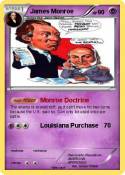

In other words, the Tallmadge amendments would admit Missouri only as a free state.

The first barred new slaves from entering the state the second emancipated all Missouri slaves born after admission upon their 25th birthday. of New York attached two amendments to the statehood bill. Congressional debate on Missouri exploded when Congressman James Tallmadge, Jr. Approximately 16 percent of the Missouri settlers were enslaved blacks, and most of the white settlers either owned slaves or hoped to become slave owners in the future. The Missouri CompromiseĮarly in 1819, settlers in the Missouri Territory applied for admission to the Union. Monroe did support the policy proposed by Secretary of Treasury William Crawford to relax payment terms on mortgages for lands purchased from the federal government. economy would soon rebound from the panic (and indeed it did-the depression ended by 1823). In addition, Monroe believed that depressions were natural features of a maturing economy and that the U.S. The power to change economic policies rested with the states and the Bank of the United States. The result was high unemployment and an increase in bankruptcies and foreclosures.Īlthough some critics derided Monroe for not responding more forcefully to the economic downturn, he could do little to alleviate its short-term effects. A number of state banks suspended payment on their notes and declared bankruptcy, with the Second Bank of the United States shifting to more conservative policies. The panic stemmed from declining imports and exports, and sagging agricultural prices. It was the first major depression to hit the country since the 1780s.

Two years into his presidency, Monroe faced an economic crisis known as the Panic of 1819. He made the final decisions and expected his cabinet to support and implement them. Although he encouraged debate and solicited advice from his cabinet, there was never any doubt that he was firmly in charge. He then gave them a lot of freedom to do their jobs. The President assembled a group of intelligent and talented men who were very good administrators. Monroe's cabinet has often been noted as an exceptionally strong one. Monroe turned to an old friend, William Wirt, to be his attorney general and decided to keep Benjamin Crowninshield as secretary of the navy. Unable to persuade his first choices, he picked to John C. Crawford from Georgia as secretary of treasury and sought out a westerner to serve as secretary of war. Adams had a long diplomatic career, and with their similar backgrounds in foreign affairs the two men established a good working relationship. Wanting to assemble a group of advisers from different regions of the country, he turned to New England native John Quincy Adams as his secretary of state. One of Monroe's first acts as President was to put together his cabinet. All three tours helped familiarize the people with their President, and Monroe's endearing personality won many converts. Although those trips did not match the enthusiasm of the first, they gave Monroe an opportunity to reach out to different regions of the country. The first tour was such a success that Monroe embarked on two others-one of the Chesapeake Bay area in 1818 and one of the South and West in 1819. The Boston Columbian Centinel described his reception in Massachusetts as the beginning of an "Era of Good Feelings" for the nation-a phrase that is now often used to describe Monroe's presidency. Everywhere he went, he was praised and applauded. The trip took fifteen weeks and allowed Monroe to come in contact with more people than any previous sitting President. From there, he turned west to Detroit and then southeast back to Washington, D.C. In June 1817, Monroe began his first tour of the North, traveling up the coast to Portland, Maine. The stated reason for the tour was to inspect defense fortifications, but it also allowed Monroe to reach out to Americans throughout the nation and exhibit his relaxed and affable personality. Prior to moving into the still damaged Executive Mansion, which was burned by the British during the War of 1812, President James Monroe revived the presidential tour of the country, which was first undertaken by George Washington. The new President, moreover, was personable, extremely popular, and interested in reaching out to all the regions of the country. The nation had declared victory in the War of 1812 and the economy was booming, allowing Monroe to turn his attention toward domestic issues. At the beginning of Monroe's presidency, Americans were feeling generally optimistic.


 0 kommentar(er)
0 kommentar(er)
